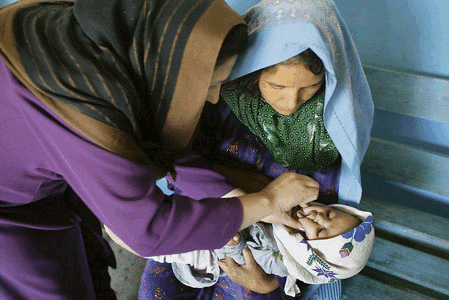India’s Victory over Polio
Jan. 31, 2012
India celebrated a major victory against polio in January with the announcement that for the first time, the country had not recorded any new cases of the crippling disease during the previous 12 months. In 2009, at least 741 cases of infection with wild (naturally occurring) poliovirus were recorded in India, more than in any other country. In 2011, several million government and foreign aid workers fanned out across India in two national immunization campaigns aimed at reaching some 172 million children under the age of 5. About 70 million children in the highest-risk areas received multiple vaccinations. Officials from the World Health Organization (WHO) said India’s $2-billion campaign to eradicate the disease was “arguably its greatest public health achievement.”
Polio is caused by a virus that enters the mouth and nose, then travels to the nervous system through the intestines. Crowded living conditions and poor sanitary conditions make it easier for the virus to spread. The virus may attack the nerve cells of the brain and spinal cord, causing paralysis. However, infection by poliovirus does not always result in severe illness. Some patients show only mild symptoms, such as fever, headache, sore throat, and vomiting. Some polio patients suffer new symptoms 30 years or more after the initial attack, a complication called post-polio syndrome.
The first effective weapon in preventing poliomyelitis was a vaccine developed by Jonas Salk in the early 1950′s. Albert B. Sabin later developed an effective oral polio vaccine.

UNICEF promotes the health and well-being of young people throughout the world. This infant is receiving a polio vaccination as part of a UNICEF immunization program in Afghanistan. AP/Wide World
India’s efforts to eradicate the disease were supported by the Global Polio Eradication Initiative, launched in 1988 by WHO, Rotary International, and the United Nations Children’s Fund. By 2007, the Initiative’s efforts had slashed worldwide polio cases by 99 percent. In 2012, wild poliovirus was endemic (constantly present somewhere in the population) in only three countries–Afghanistan, Nigeria, and Pakistan, though polio outbreaks sometimes occurred in other countries. No cases of polio have been recorded in the United States since 1984. Public health officials hope to make polio the second infectious disease eradicated worldwide. In 1980, officials from WHO formally announced that smallpox, one of most feared diseases in history, had been eliminated worldwide.
Additional World Book articles:
- Fighting a Persistent Foe (A Special Report)
- Kenny, Elizabeth
- Perlman, Itzhak
- Roosevelt, Franklin Delano (Battle with polio)


